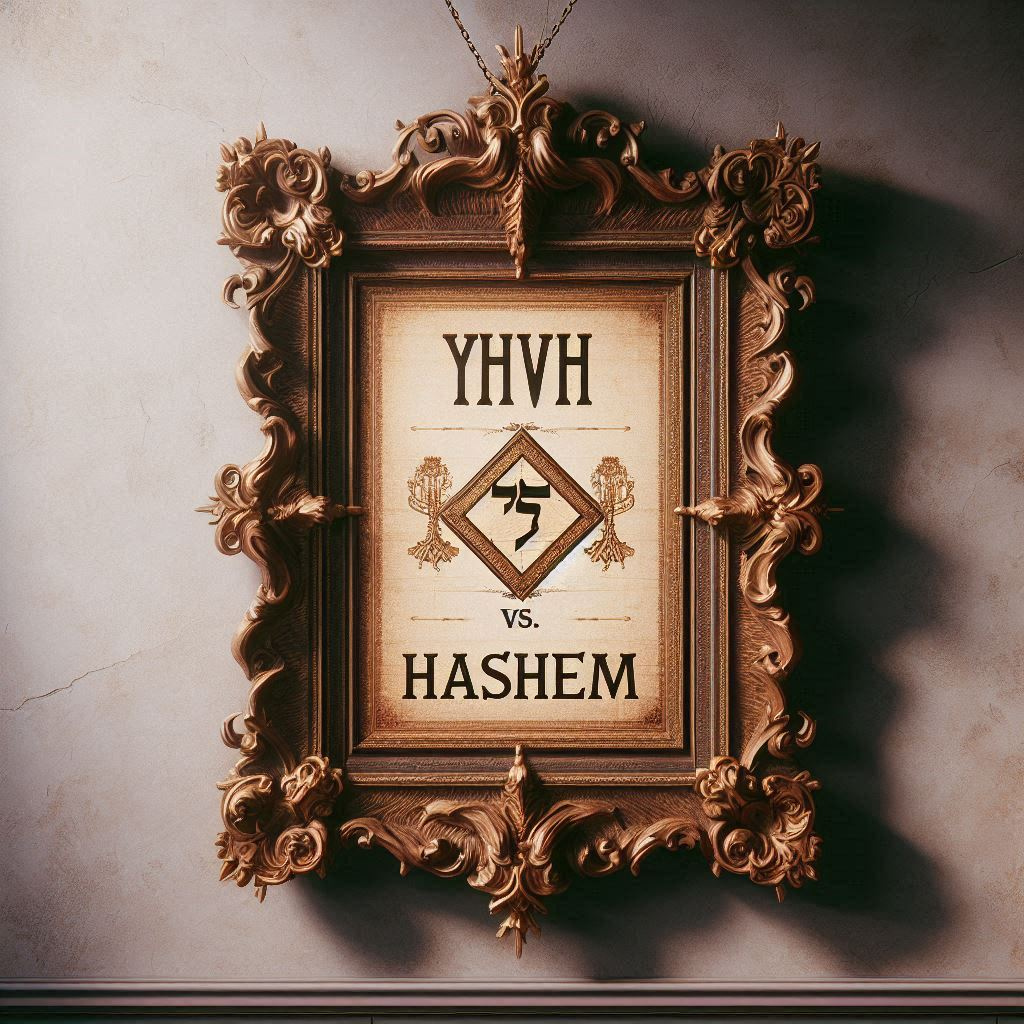The Ineffable Name Controversy: Breaking Traditions and Unveiling Truth
Introduction: In the realm of faith, the Name of Yehovah holds profound significance. However, the tradition of not uttering or writing this sacred name has sparked controversy and debate. This blog post delves into the origins, interpretations, and implications of this practice, shedding light on the true essence of the Ineffable Name.
The Tradition of Writing “G-d”: Many Jewish communities avoid writing the full name of God, opting for “G-d” instead. This practice stems from a passage in Deuteronomy, which commands the Israelites to destroy the names of non-Israelite gods. Rabbinic interpretations extended this to mean that God’s name should not be erased, leading to the tradition of writing “G-d”1.
Rabbinic Interpretations and Misinterpretations: Rabbinic authorities, such as Rashi, interpreted the prohibition against erasing God’s name as a reason to avoid writing it altogether. This led to the practice of storing or burying Jewish literature containing the name “God” once it fell into disrepair2. However, this interpretation has been contested, as the original scriptural intent was to prevent the worship of Yehovah in the manner of pagan gods3.
The True Name of Yehovah: The Father revealed His eternal and holy name to Moses, declaring it to be remembered for all generations (Exodus 3:15). Despite this, Rabbinic authorities replaced the name Yehovah with titles and descriptors like “Adonai” and “Elohim,” effectively nullifying the Torah’s instructions regarding the use of God’s name4.
The Impact of Rabbinic Regulations: By enacting regulations against using God’s name, Rabbinic authorities transgressed Yah’s eternal Torah. This has led to a widespread practice of substituting God’s name with titles, which often have pagan origins5. This practice contradicts the scriptural mandate to declare and magnify Yehovah’s name throughout the earth6.
Conclusion: As Torah-observant disciples, it is our duty to honor and proclaim the true name of Yehovah. By doing so, we fulfill the scriptural command to declare His name to all generations. Let us break free from traditions that obscure the true essence of God’s name and embrace the profound significance of Yehovah.
For those of you who would like to explore this week’s Torah Reading 13, I invite you to read and listen to the discussion entitled “Yehovah: the God Who Sees.” (Yehovah-The God Who Sees-STAR 13)
But Paul Said There is Neither Jew Nor Greek–Part 2 of Israel’s Inextricable Link to our Salvation Series
This is “But Paul Said There is Neither Jew nor Greek—Israel’s Inextricable Link to our Salvation Part 2 In part 1 of this series, I gave what I hope was a clear explanation of why I was led to explore Israel’s unshakable link to our salvation, which in great part was...
Israel’s Inextricable Link with our Salvation Part 1
This is "Israel's Inextricable Link to our Salvation Part 1." Back on 10/13/2023, I posted a teaching and discussion entitled Ministry Update and My Thoughts and Reflections on Hamas' Invasion of Israel. In the Hamas' Invasion of Israel portion of the post I expressed...
Are God’s People Required to Wear Tzitzit Today and is the Wearing of Them a Salvific Issue?
This is “Are God’s People Required to Wear Tzitzits Today and Is the Wearing of Tzitzits a Salvific Issue?” And just to cut to the chase, beloved, the answer to both questions is yes. I’ll explain why in just a few. Why Discuss Tzitzit Wearing? The reason I was led to...
Invitation to Messianic Discipleship-From the Sinner’s Prayer to True Messianic Discipleship
Welcome to The Messianic Torah Observer. Maybe you’ve been here before and have more questions about our ministry or the Messianic, Hebrew Roots, or Nazarene Israelite faith. And if that’s the case, I’m happy you’re here and I’m happy to answer questions you may have...
The Deep Abiding Mysteries of the Aaronic Blessing-My Thoughts and Reflections of Torah Reading 104
Greetings and Salutations Greetings, Saints of the Most High. This Rod coming to you from the DFW, thanking you for taking the time from your busy schedules to fellowship with me on this glorious Shabbat. As always, I hope, trust, and pray that this installment...
TMTO Ministry Update and My Thoughts and Reflections on Hamas’ Invasion of Israel
There are two things I wish to cover in this installment of TMTO. The first will be an update on this ministry: What's happening and what's ahead. Secondly, I want to share my thoughts and reflections on the terrible, tragic, horrific, heinous events that transpired...
Ten Things God Expects us to do for Sukkot-The Feast of Tabernacles 2023
In today's installment, I will be putting out to you what I have elected to call ten things Yehovah says in His Word that every Netsari, disciple of Yeshua Messiah, must do for Sukkot/Tabernacles. Now, some of you will be acutely aware of many of these things...
The Variegated Shadows of Yom Kippur 2023—Or When Payback is a Bear for the Enemies of God and His Set Apart People
Yom Kippur, the Holiest Day of Yah's Calendar Year Yom haKippurim is considered by many in our Faith and orthodox Judaism as the holiest day of Yah's biblical calendar year. On this holiest of days, Yah mandated His chosen ones to "afflict their...
Thoughts and Reflections on Yom Teruah-The Feast of Tabernacles 2023
This is a special TMTO post that I pray will encourage, and maybe inform you, as it relates to the imminent advent of Yom Teruah, or the Day of the Blowing of Trumpets. As you may, or may not know, we are on the very cusp of receiving this Moedim, this...
Upholding the Utter Holiness of God-My Thoughts and Reflections on Torah Reading 100
Greetings and Shabbat Shalom. It is my hope, trust, and prayer that this posting finds you, your families, and your fellowships well and blessed on this warm but blessed Sabbath in the DFW. A Short Passage with a Big Message This 100th parashah of our three-year...

